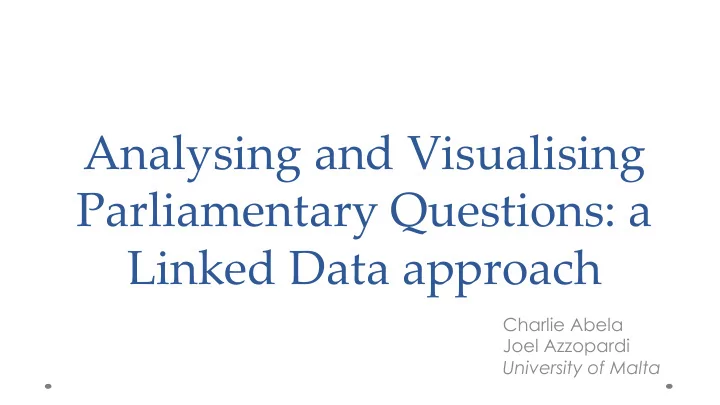

Analysing and Visualising Parliamentary Questions: a Linked Data approach Charlie Abela Joel Azzopardi University of Malta
Overview ● Problem ● Challenges ● PQViz
Problem ● Parliamentary Questions (PQs) are intended to scrutinise the respective governments and keep them accountable. ● Individual Members of Parliament (MPs) table questions to the executive members of Government to scrutinise the Government’s operative and financial administration. ● The number of PQs can become staggeringly high over time causing a number of challenges: ○ How to keep track of information encapsulated within the PQs? ○ How to effectively search for information?
Current Scenario http://pq.gov.mt
Current Scenario http://pq.gov.mt
Data Issues ● Duplicated and unlinked data ○ Multiple MP entries for the same MP ○ Non-existing link to the MP’s political profile
Search Issues ▪ Issues with current search facility Not User Friendly ▪ Difficult and time-consuming to search, especially for non-technical ▪ persons. One cannot 'visualise' the collection to view the prevalent terms/ ▪ concepts in a period. ▪ Apart from the standard keyword search, a user would wish to view how other concepts are related to the concept of interest.
What We are Working On ▪ Making Parliamentary data more accessible ▪ Web / Mobile App (PQViz) ▪ Enriched Search and Visualisation graph-based search in context over linked data different visualisation techniques and integrated views over the data
PQViz: Linking PQs ▪ PQ data is formatted in XML and is received via a web service. ▪ MP profile data is extracted using dedicated wrappers. ▪ PQ data is stored in MongoDB. ▪ RDF Translator is used to convert data from JSON to RDF/XML. ▪ Data is persisted in Apache Fuseki Server.
PQViz: PQ data model
PQViz: MP data model
PQViz: Visualisation ▪ MPs with the highest activity. ▪ Possible Sorting by Party. ▪ Who asked most? ▪ Who answered most?
PQViz: Visualisation ▪ Activity by each MP. ▪ MP Photo, Affiliation and Roles. ▪ Questions Asked ▪ Questions Answered.
PQViz: Visualisation ▪ Interactions between Individual MPs. ▪ Profile of Each MP. ▪ PQs asked/answered ▪ Date Answered. ▪ Interim/Final Indication.
PQViz: work in progress ▪ Extraction of PQ Key Words / Concepts. ▪ Search based on Keywords / Concepts. ▪ Which MP asked about the same topic (e.g. “health” or a particular locality) ▪ Which are the most popular topics?
Future Work ▪ Harmonisation of PQ data entry ▪ Providing context (from news reports) to PQs
Questions Charlie Abela Joel Azzopardi charlie.abela@um.edu.mt joel.azzopardi@um.edu.mt
Recommend
More recommend